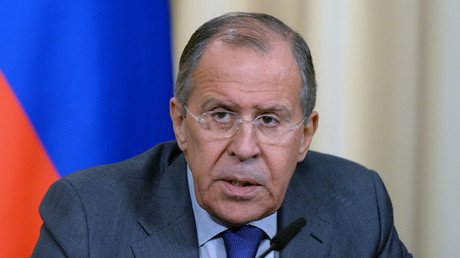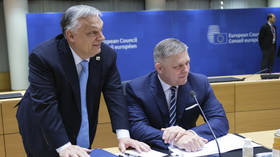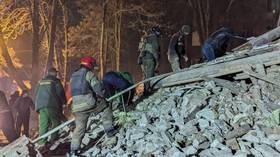Russia hoping Tillerson can stop 'Pentagon provocations' in Syria
A debate seems to be raging inside Washington about whether or not to work with Russia in Syria. However, there is also a deeply entrenched position in the US that incentivizes war and sees it as business, says Brian Becker from the ANSWER Coalition.
Russian Foreign Minister Sergey Lavrov and US Secretary of State Rex Tillerson spoke by telephone in a call initiated by Washington. The move on the part of the Trump administration appears to be an attempt to resolve their differences over Syria.
It is the first time they have spoken since the downing of a Syrian military jet by the US more than a week ago.
RT: In the phone conversation, Foreign Minister Lavrov reportedly urged Secretary of State Tillerson to avoid any "provocations" against the Syrian military. Do you think the US will listen to that warning and stop targeting Syrian government forces?
Brian Becker: It is very hard to know whether the Lavrov-Tillerson meeting will lead to some sort of real agreement between Russia and the US regarding a process in Syria; either a peace process or the process for the so-called 'de-confliction zones.' Over and over again for the past few years there have been agreements, there were numerous agreements between the US government, John Kerry, the Secretary of State and his counterpart Lavrov, the Foreign Minister. That even happened in September and October, and then the Pentagon sabotaged those agreements because some people in the Pentagon don’t want a resolution on the Syrian crisis.
You see, the Russian Foreign Minister is asking Tillerson to use his influence in the US to come to a resolution to stop the provocations, which have included the shoot down of a Syrian jet and two Syrian drones and the bombing of Syrian fixed positions. Will Tillerson be able to do it and overcome the Pentagon’s obstinacy? It is hard to know.
RT: After the US shot down a Syrian fighter jet on June 18th, Russia warned that any US plane (flying west of the Euphrates river) could be treated as a target. Do you think Washington was alarmed by that?
BB: Yes, I think the US position is running its course. Since 2011, every effort by the US - militarily, politically - has actually been a catastrophe and then the US has had to revise its position to lower its goals. The first goal was to overthrow the Syrian government and that became impossible. Now the US has tried to reenter the Syrian military zone following the election of Donald Trump and when Trump became president. Again I think trying to create what would in effect be an American sphere of influence. That may not be successful either. Of course, it is illegal, the US has not been invited into Syria by the sovereign government in Syria. But militarily it may not be successful either. So, the US may be scaling down its expectations, but we don’t know yet. It is too early to tell.
The neoconservative forces in the US are pushing for an escalation. And that is the big danger here. I hope that Secretary of State Tillerson is sincere in his efforts to reach out and start restraining the neoconservative forces. In the past we’ve seen the State Department says one thing but then something different happens on the ground. Hopefully, it is sincere but we have to wait what the actions are. - Investigative journalist Rick Sterling, to RT.
RT: Why do you think the US Secretary of State decided to reach out to Russia at this time?
BB: I think the initiative from the Secretary of State might reflect the fact that there could be a debate going on inside the Trump administration and a division of opinion about whether or not to work with Russia in order to find a final end of this terrible war that has taken the lives of half a million people, that has fragmented the country. That may be one position in the US government.
And there is another position which incentivizes war, which sees war as good business, which recognizes the fact that while the US can’t win in Syria, can’t overthrow the Assad government by continuing the conflict, it has strengthened its position following the defeat of ISIS, in other words, they have a dog in a fight in a post-war sort of reorganization of Syria. There may be a debate going on in Washington or at least irresolution, in other words, uncertainty about what the US position really should be.
RT: What should the road map be to resolve the Syrian crisis?
BB: The road map has to include the following items: the US must not believe that it can create a zone of influence inside of a post-war Syria. Secondly, it must stop the provocations and the sabotage of each and every earlier agreement by bombing the Syrian military positions. If the US is dedicated to the destruction of ISIS and al-Qaeda, it must stop at the same time hitting and destroying Syrian military targets or their allies. The US government has to finally come to a conclusion that actually favors peace. If that is the case, there obviously will be a negotiated settlement. The Syrian government wants it, the Syrian people certainly want it.
The statements, views and opinions expressed in this column are solely those of the author and do not necessarily represent those of RT.













